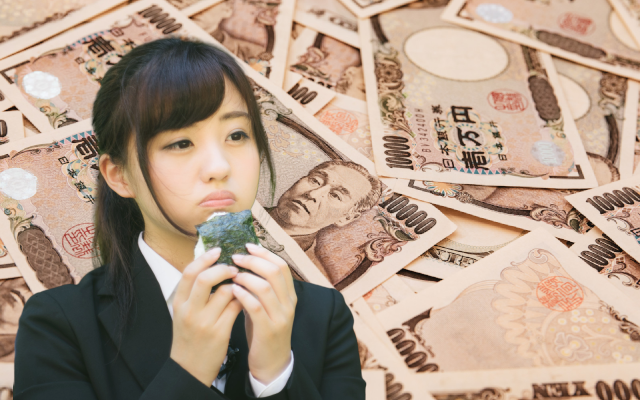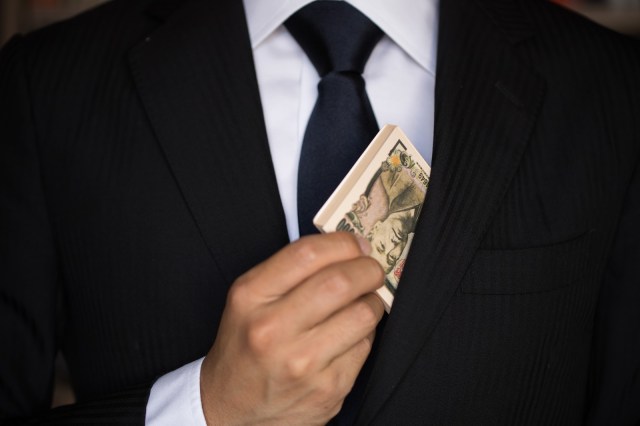
It’s so bad that the region is now slang for “corrupt election.”
Japanese elections are often rife with craziness, ranging from the benign such as a candidate appearing next to a giant snow-white cat, to the horrific such as campaign posters that actively promote misogyny.
But recently, campaign corruption in the northern Aomori Prefecture has come to light that could potentially put all of the others to shame.
Satoshi Sawada, a member of the Aomori Prefectural Assembly, was arrested earlier this week for bribery in the April prefecture election this year. The allegations against him include paying several hundred dollars to assembly members in Sannohe, a town in Aomori, to arrange the votes in his favor. Nine of the twelve Sannohe assembly members are suspects in the case, and Sawada has seemingly not denied paying them, instead claiming that the money was for “service fees.”
▼ I mean, they did technically perform a service…
an illegal service, but hey, details schm-etails!
But that’s only the top of the iceberg. Residents of Aomori have come forward claiming that corruption is rampant in their prefecture, with stories about getting direct bribes from candidates such as: “Fifty years ago I got 300 yen,” or “Twenty years ago I’d go a candidate’s speech, shake hands, and get a 10,000-yen bill in my hand.” Apparently inflation in bribery is a thing!
Others have said that they were given onigiri (rice balls) with 10,000-yen bills hidden inside, or just got gifts such as fishing poles or manga in exchange for votes.
In 2014 in Aomori’s Hirakwa City, the mayor and 15 out of 20 assembly members were arrested for bribery. It was so incredible that bribery elections got the name “Tsugaru Election,” with Tsugaru referring to the western region of Aomori.
▼ You know that when your region is literally the definition of corruption, you have a problem.
Kappei Ina, a celebrity from Aomori, has talked at length about election corruption in his home prefecture, saying:
“I’ve heard stories of the election committee actually eating the ballots of their opponents. Or if someone’s kid wanted a bike, they’d just tell them, ‘Well an election’s coming up soon, so just wait until then.’ The corrupt elections are everywhere, from Tsugaru to the south to Sannohe. We shouldn’t call bribery elections ‘Tsugaru Elections,” just call them ‘Aomori Elections.'”
Some analysts have said they fear that even with the recent arrests, the corruption is so deep that it will continue anyway. Others have claimed that “gift exchange culture” is so ingrained in the region that it’s going to be hard to change, and that if they “actually went after all the politicians who went against election law, all the jails would be full.”
Here’s how Japanese netizens reacted to the news:
“I’ve never tried it before, but a 10,000-yen bill seems like a bad filling for an onigiri.”
“If they’d instead put onigiri inside of 10,00-yen bills, they would’ve been safe.”
“All the jails being full of corrupt politicians seems… fine to me?”
“Ugh, just thinking about being handed a bill in the greasy hand of an old man makes me nauseous.”
“Actually, I’d be more suspicious of places where you don’t hear corruption stories like this lol.”
We’ll have to see what the future holds for Aomori, if they can escape their reputation of “Tsugaru Elections.” Until then though, we think that the Nara deer have the right idea: let’s just eat all of the politicians instead.
Source: Nippon News Network, livedoor NEWS via Hachima Kiko
Top image: Pakutaso (1, 2) (Edited by SoraNews24)
Insert images: Paktaso (1, 2)
● Want to hear about SoraNews24’s latest articles as soon as they’re published? Follow us on Facebook and Twitter!



 Communist politician seen campaigning with Pikachu knockoff in Japan【Photo】
Communist politician seen campaigning with Pikachu knockoff in Japan【Photo】 Scandal rocks McDonald’s Kanto-Kansai burger election, Tokyo Roast Beef Burger caught lying to voters
Scandal rocks McDonald’s Kanto-Kansai burger election, Tokyo Roast Beef Burger caught lying to voters Japan elects its first openly transgender man to public office
Japan elects its first openly transgender man to public office Japan’s “crying politician” found guilty of fraud
Japan’s “crying politician” found guilty of fraud Nurse cosplay: Would-be Hiroshima City Councilwoman’s innovative campaign tactic
Nurse cosplay: Would-be Hiroshima City Councilwoman’s innovative campaign tactic Foreigner’s request for help in Tokyo makes us sad for the state of society
Foreigner’s request for help in Tokyo makes us sad for the state of society Japanese city loses residents’ personal data, which was on paper being transported on a windy day
Japanese city loses residents’ personal data, which was on paper being transported on a windy day Should you add tartar sauce to Japanese curry rice? CoCo Ichi makes diners an unusual offer
Should you add tartar sauce to Japanese curry rice? CoCo Ichi makes diners an unusual offer Seaside scenery, history, and so many desserts on Yokohama’s Akai Kutsu【Japan Loop Buses】
Seaside scenery, history, and so many desserts on Yokohama’s Akai Kutsu【Japan Loop Buses】 Akihabara pop-up shop sells goods made by Japanese prison inmates
Akihabara pop-up shop sells goods made by Japanese prison inmates Ghibli Park now selling “Grilled Frogs” from food cart in Valley of Witches
Ghibli Park now selling “Grilled Frogs” from food cart in Valley of Witches Mt. Koya planning to instate visitor’s tax to cope with huge tourist numbers
Mt. Koya planning to instate visitor’s tax to cope with huge tourist numbers Historical figures get manga makeovers from artists of Spy x Family, My Hero Academia and more
Historical figures get manga makeovers from artists of Spy x Family, My Hero Academia and more Anime girl English teacher Ellen-sensei becomes VTuber/VVTUber and NFT
Anime girl English teacher Ellen-sensei becomes VTuber/VVTUber and NFT Beautiful Ghibli sealing wax kits let you create accessories and elegant letter decorations【Pics】
Beautiful Ghibli sealing wax kits let you create accessories and elegant letter decorations【Pics】 McDonald’s new Happy Meals offer up cute and practical Sanrio lifestyle goods
McDonald’s new Happy Meals offer up cute and practical Sanrio lifestyle goods Japanese ramen restaurants under pressure from new yen banknotes
Japanese ramen restaurants under pressure from new yen banknotes French Fries Bread in Tokyo’s Shibuya becomes a hit on social media
French Fries Bread in Tokyo’s Shibuya becomes a hit on social media Studio Ghibli releases new action figures featuring Nausicaä of the Valley of the Wind characters
Studio Ghibli releases new action figures featuring Nausicaä of the Valley of the Wind characters New private rooms on Tokaido Shinkansen change the way we travel from Tokyo to Kyoto
New private rooms on Tokaido Shinkansen change the way we travel from Tokyo to Kyoto Red light district sushi restaurant in Tokyo shows us just how wrong we were about it
Red light district sushi restaurant in Tokyo shows us just how wrong we were about it Tokyo Tsukiji fish market site to be redeveloped with 50,000-seat stadium, hotel, shopping center
Tokyo Tsukiji fish market site to be redeveloped with 50,000-seat stadium, hotel, shopping center All-you-can-drink Starbucks and amazing views part of Tokyo’s new 170 meter-high sky lounge
All-you-can-drink Starbucks and amazing views part of Tokyo’s new 170 meter-high sky lounge Studio Ghibli releases Kiki’s Delivery Service chocolate cake pouches in Japan
Studio Ghibli releases Kiki’s Delivery Service chocolate cake pouches in Japan New definition of “Japanese whiskey” goes into effect to prevent fakes from fooling overseas buyers
New definition of “Japanese whiskey” goes into effect to prevent fakes from fooling overseas buyers Our Japanese reporter visits Costco in the U.S., finds super American and very Japanese things
Our Japanese reporter visits Costco in the U.S., finds super American and very Japanese things Studio Ghibli unveils Mother’s Day gift set that captures the love in My Neighbour Totoro
Studio Ghibli unveils Mother’s Day gift set that captures the love in My Neighbour Totoro More foreign tourists than ever before in history visited Japan last month
More foreign tourists than ever before in history visited Japan last month New Pokémon cakes let you eat your way through Pikachu and all the Eevee evolutions
New Pokémon cakes let you eat your way through Pikachu and all the Eevee evolutions Sales of Japan’s most convenient train ticket/shopping payment cards suspended indefinitely
Sales of Japan’s most convenient train ticket/shopping payment cards suspended indefinitely Sold-out Studio Ghibli desktop humidifiers are back so Totoro can help you through the dry season
Sold-out Studio Ghibli desktop humidifiers are back so Totoro can help you through the dry season Japanese government to make first change to romanization spelling rules since the 1950s
Japanese government to make first change to romanization spelling rules since the 1950s Ghibli founders Toshio Suzuki and Hayao Miyazaki contribute to Japanese whisky Totoro label design
Ghibli founders Toshio Suzuki and Hayao Miyazaki contribute to Japanese whisky Totoro label design Doraemon found buried at sea as scene from 1993 anime becomes real life【Photos】
Doraemon found buried at sea as scene from 1993 anime becomes real life【Photos】 Tokyo’s most famous Starbucks is closed
Tokyo’s most famous Starbucks is closed One Piece characters’ nationalities revealed, but fans have mixed opinions
One Piece characters’ nationalities revealed, but fans have mixed opinions We asked a Uniqlo employee what four things we should buy and their suggestions didn’t disappoint
We asked a Uniqlo employee what four things we should buy and their suggestions didn’t disappoint Princesses, fruits, and blacksmiths: Study reveals the 30 most unusual family names in Japan
Princesses, fruits, and blacksmiths: Study reveals the 30 most unusual family names in Japan City Councilman Super Crazy Kun’s election victory ruled invalid by commission
City Councilman Super Crazy Kun’s election victory ruled invalid by commission Joker in the running for Chiba Gubernatorial Election
Joker in the running for Chiba Gubernatorial Election “My father was arrested”—Student’s award-winning essay tells the story of a crime in her family
“My father was arrested”—Student’s award-winning essay tells the story of a crime in her family NHK’s US election banner has netizens wondering if it’s the new Street Fighter
NHK’s US election banner has netizens wondering if it’s the new Street Fighter Japan’s top train station bento boxed lunches for 2016, as picked by travelers
Japan’s top train station bento boxed lunches for 2016, as picked by travelers High schooler “forced” to quit school sues Kumamoto prefecture for a single yen
High schooler “forced” to quit school sues Kumamoto prefecture for a single yen Japanese politician scraps plan to use Animal Crossing for political campaign tour
Japanese politician scraps plan to use Animal Crossing for political campaign tour Japanese Prime Minister Shinzo Abe announces resignation
Japanese Prime Minister Shinzo Abe announces resignation Japan is getting apple pie-flavor KitKats with help from a 136-year-old sweets shop
Japan is getting apple pie-flavor KitKats with help from a 136-year-old sweets shop 7-Eleven Japan opens first stores in Kouchi Prefecture, nationwide domination almost complete
7-Eleven Japan opens first stores in Kouchi Prefecture, nationwide domination almost complete Anger sparks as Tokyo politician claims “legally protecting lesbians and gays will ruin district”
Anger sparks as Tokyo politician claims “legally protecting lesbians and gays will ruin district” Super Crazy Kun wins seat in Toda City Council election
Super Crazy Kun wins seat in Toda City Council election Leadership does nothing despite public harassment of Tokyo Metropolitan Assembly member
Leadership does nothing despite public harassment of Tokyo Metropolitan Assembly member Japanese blogger calls for party to celebrate Hitler’s birthday, whines when criticized
Japanese blogger calls for party to celebrate Hitler’s birthday, whines when criticized Kit Kat celebrates the Year of the Monkey with special Chinese Zodiac packages
Kit Kat celebrates the Year of the Monkey with special Chinese Zodiac packages
Leave a Reply